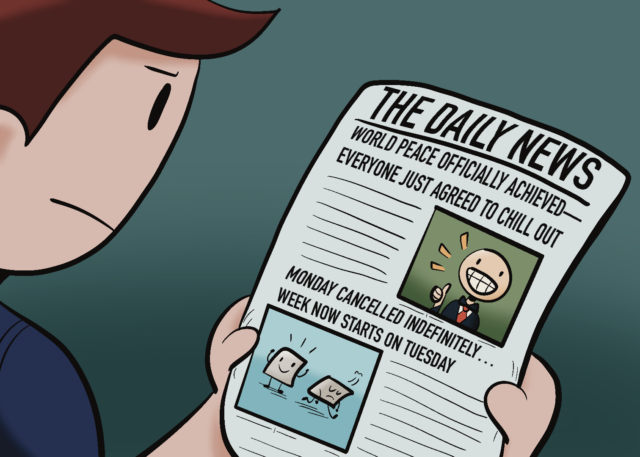By The Editorial Board
You are bombarded all day long from every direction with the news. It’s exhausting. More than that, to shut it out altogether, to close your eyes and protect your peace, is tempting.
You might even be thinking that it’s not important to watch or read the news anyway, since all the media does is lie. Better to just block out the noise. But journalism, the news, is not just noise — it’s an essential function in a democracy. Without it, the country is shut out from the halls of power where decisions that impact real lives are made.
Let’s start with some common misconceptions. What is news, anyway? What is “the media”? Well, there are a bunch of different ways to get your news, such as TV, print or digital stories, and on social media. News is also delivered on local, national and international levels. When you watch a local station — like Waco’s KWTX, KXXV, KCEN, KWKT, for instance — you are seeing the work of people who live in the communities they cover, who are highly trained in journalistic ethics and who you will probably never see give their political opinions on air. These people are professionals who are deeply passionate about what they do. Lord knows local journalists aren’t in this for the check.
When you get on a national level with channels such as CNN or Fox, it gets difficult to tell what is news and what is opinion, so much so that in 2020, when Tucker Carlson was sued for slander, Fox lawyers argued that the host’s words were “loose, figurative or hyperbolic.” And in 2023, Fox paid voting machine company Dominion nearly $800 million to avoid going to trial over the broadcaster’s unfounded claims surrounding voter fraud in the 2020 election. In the same vein of loose, imprecise speech, ABC News agreed to pay a Trump-related foundation $15 million after anchor George Stephanopoulos said on air that the president was found liable for the rape of E. Jean Carroll. In fact, a jury found that Trump sexually abused and defamed Carroll, but did not find him liable for rape.
This kind of language isn’t journalism, which prizes accuracy above all else. It’s purposefully inflammatory and it hides under the label of news, hoping you won’t notice, paying no mind to the damaged reputation of journalists everywhere.
But remember that the media is not a monolith. It includes the tens of thousands of news analysts, reporters, journalists and editors across the country. The vast majority of these people are deeply committed to ethical standards and journalism’s highest value: truth. And those that are so blasé about reporting the facts that they would be sued for libel on separate occasions shouldn’t be called journalists at all.
If you only take a couple of things away from reading this, let this be one of those things: there is a difference between real journalism and the entertainment news you see on channels like these. One is reporting done by people who are not famous and not looking to be, and the other understands that outrage and division sell.
Let’s get back to the local level. Research suggests that towns without a thriving news ecosystem will have low civic engagement, low voter turnout and high spending on the part of the city council. Why is that? It’s because there is no watchdog in the room at city council meetings, nobody to question them, nobody to let the public know that an item even passed. Here’s a simple truth: an informed public is a public that votes, and it makes sense why that is. You can’t care about what you don’t know, and it might even start to feel like your life isn’t being impacted. But it is, especially when money goes to raising city council members’ salaries instead of fixing roads, funding public works, social services and more. Journalism is about providing useful, relevant information and holding those with power accountable.
The average person who works a 9-to-5 and spends the rest of their time cooking, cleaning, taking care of family or going to school or another job doesn’t have the time to go speak with their representative or see what’s up at city council. You won’t find them talking to cops at a crime scene; they’re busy doing their job, busy trying to survive. This is why we have journalists. Reporters are a middleman between those with information and those without it. We take the time to get the answers that people need, when they need them, and deliver that information in a way that is accurate and makes sense. We sniff out lies and go digging for the truth. We cut through jargon and industry speak and put things into plain English. We have an essential function — to serve the public — and that will always matter.
Still don’t believe us? Ask yourself this: why do the most authoritarian countries only have state-sponsored media, having done away with their free press first? Ever wondered why Wall Street Journal reporter Evan Gershkovich was detained in Russia on falsified espionage charges?
When someone in power tells you that you cannot trust journalists, it’s because journalists expose things the powerful don’t want you to know. So the next time someone generalizes about “the media” or seeks to curtail press freedoms, ask yourself what it is they’re trying to hide.


